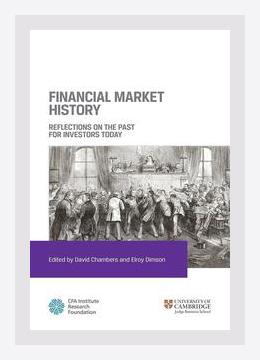Finance, Economics, Trading, InvestingFinancial Markets and Instruments
Introduction
“Financial Market History: Reflections on the Past for Investors Today” by David Chambers is a compelling exploration of the historical trends and events that have shaped modern financial markets. As markets evolve, understanding the past is crucial for navigating the complexities of the present and future. This book offers invaluable insights by drawing connections between historical events and contemporary market behaviors. For investors seeking to deepen their understanding of financial markets, this book serves as both a guide and a cautionary tale, reminding readers that history often repeats itself in surprising ways.
Understanding Financial Market History
1. The Importance of Historical Context in Financial Markets
Chambers begins by emphasizing the importance of historical knowledge in the world of finance. He argues that many investors overlook the lessons that history provides, often leading to repeated mistakes. By analyzing past financial crises, market bubbles, and economic booms, Chambers demonstrates how understanding these events can provide a clearer perspective on current market conditions.
Example: One of the key historical events discussed is the South Sea Bubble of 1720, which serves as an early example of speculative mania. Chambers uses this event to illustrate the dangers of over-enthusiasm in markets, a lesson that remains relevant in today’s financial climate.
Memorable Quote: “History may not repeat itself exactly, but it often rhymes. Investors who ignore the past are doomed to repeat the mistakes of their predecessors.”
2. Major Financial Crises and Their Lessons
Chambers delves into several major financial crises, dissecting their causes and the lessons they offer for modern investors. From the Great Depression to the 2008 financial crisis, the book provides a thorough examination of how these events unfolded and their long-term impacts on the global economy.
Example: The book’s analysis of the 2008 financial crisis highlights the role of complex financial instruments like mortgage-backed securities in exacerbating the collapse. Chambers argues that understanding the intricate details of these instruments is essential for preventing future crises.
Memorable Quote: “The complexity of financial instruments can often obscure their risks, leading to a false sense of security among investors.”
Key Themes and Concepts
3. The Role of Innovation in Financial Markets
Innovation in financial markets is a double-edged sword, as Chambers illustrates. While innovation can lead to growth and increased efficiency, it can also introduce new risks. The book explores how financial innovations, such as the introduction of derivatives or high-frequency trading, have transformed markets and created new challenges for investors.
Example: Chambers discusses the rise of high-frequency trading in the 21st century, explaining how it has increased market liquidity but also raised concerns about market stability and fairness.
Memorable Quote: “Innovation is the lifeblood of financial markets, but with every new tool comes the potential for misuse and unforeseen consequences.”
4. Behavioral Finance: Understanding Investor Psychology
Chambers dedicates a significant portion of the book to behavioral finance, examining how psychological factors influence investor behavior. He explains concepts like herd mentality, overconfidence, and loss aversion, demonstrating how these behaviors have contributed to market volatility throughout history.
Example: The book provides an in-depth analysis of the dot-com bubble, highlighting how investor overconfidence and the fear of missing out (FOMO) drove irrational investment decisions, leading to the eventual market collapse.
Memorable Quote: “Markets are not always rational because the people who operate within them are driven by emotions as much as logic.”
Reflections on Historical Market Trends
5. The Impact of Geopolitical Events on Financial Markets
The book also explores the impact of geopolitical events on financial markets, showing how wars, political upheavals, and international relations have historically influenced market performance. Chambers emphasizes the importance of staying informed about global events, as they can have far-reaching effects on investment portfolios.
Example: The book examines the market impact of World War II, demonstrating how the war led to significant shifts in global economic power and the restructuring of financial markets.
6. The Evolution of Market Regulation
Chambers discusses the evolution of market regulation, from early attempts to curb speculative excesses to the more sophisticated regulatory frameworks in place today. He argues that while regulation is essential for maintaining market integrity, it can also have unintended consequences if not carefully designed.
Example: The book details the creation of the Securities and Exchange Commission (SEC) in the United States in response to the 1929 stock market crash, highlighting how the agency has played a crucial role in enforcing market transparency and protecting investors.
Conclusion: The Relevance of Financial History Today
In the concluding section, Chambers reflects on the relevance of financial history for today’s investors. He argues that while markets have changed dramatically over the centuries, the fundamental forces driving them remain the same. By studying financial history, investors can gain valuable insights into market behavior, avoid common pitfalls, and make more informed investment decisions.
Memorable Quote: “The study of financial history is not merely an academic exercise; it is a practical tool for navigating the uncertainties of the future.”
Chambers’ “Financial Market History: Reflections on the Past for Investors Today” is a must-read for anyone interested in the interplay between history and finance. By drawing on historical examples, the book offers timeless lessons that are as relevant today as they were in the past. Whether you are a seasoned investor or a newcomer to the financial world, understanding the past is crucial for making informed decisions in the present and future.
Finance, Economics, Trading, InvestingFinancial Markets and Instruments
